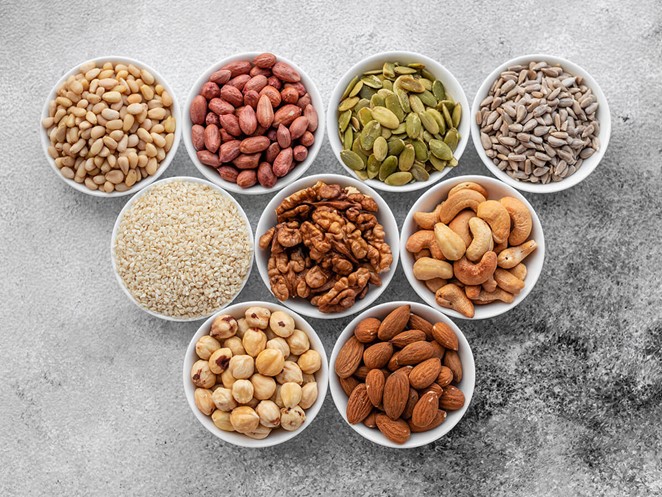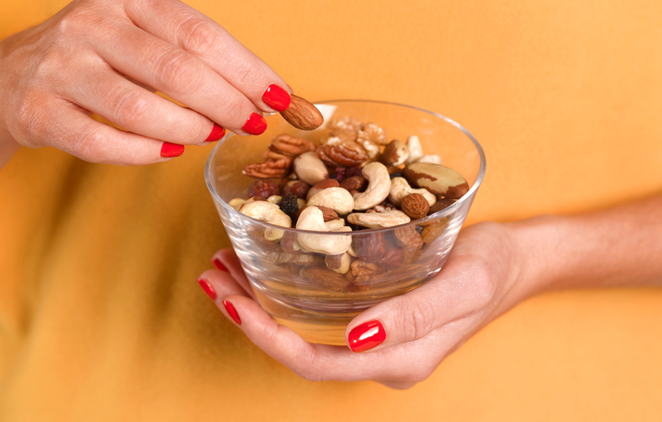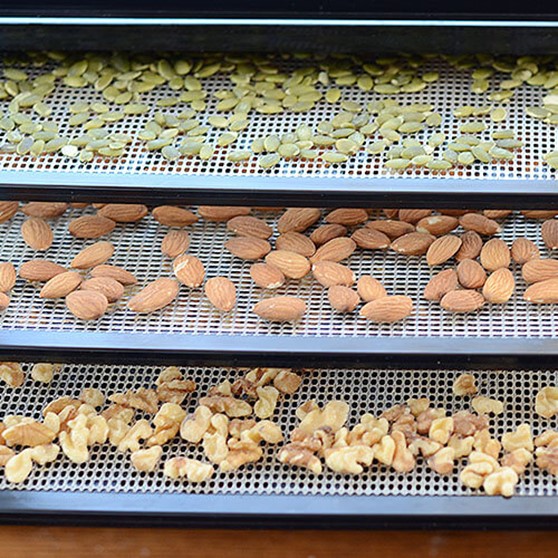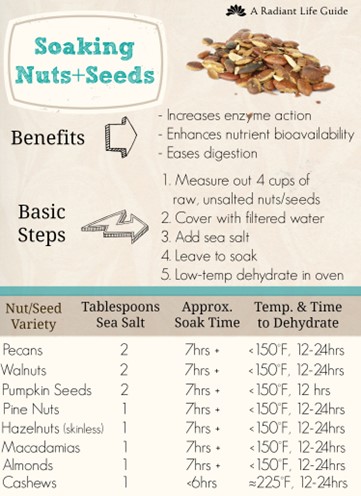Are You Soaking Your Nuts and Seeds? You Should!
Just WHY should you soak your nuts and seeds? Because raw nuts and raw seeds have notable levels of phytic acid, a form of bound phosphorous, which serves as a physiological protectant and antioxidant for plants.

While phytic acid has its uses (for one thing it safeguards seeds until germination), when eaten by humans it binds to minerals in the gastrointestinal tract, causing irritation and contributing to the potential for nutrient deficiencies. While some animals naturally produce adequate amounts of the enzyme phytase to break down this vexing anti-nutrient, humans do not, and phytate-heavy diets are troublesome.
Raw nuts and seeds also contain a significant amount of enzyme inhibitors, which act to prevent the nut or seed from sprouting prematurely in nature. These inhibitors bind up minerals and cause digestive strain for nut-munching humans.

So, we should be soaking our nuts and seeds. Why does soaking help? The phytates and enzyme inhibitors that make nuts and seeds so tricky to digest can be easily neutralized by soaking in salt water.
Then, after the water is poured off and the nuts and seeds are rinsed well, you can crisp them up with low temperature dehydrating. The combination of minerals and heat works to break down irritating compounds, while preserving the beneficial fats and proteins.

Many traditional cultures intuitively practiced these preparation methods using seawater and the sun, and passed this knowledge down through generations. The tools and techniques of modern science now prove, in an even more detailed way, just how profoundly soaking increases the bioavailability of important nutrients (notably the treasured B vitamins) and activates helpful enzymes that increase nutrient absorption.
Unfortunately, this tedious process is cumbersome and costly for large-scale manufacturers, and has been largely lost amidst the packaged convenience foods available today. So we’ll do the job ourselves. The table below gives details on soaking, but here’s how to soak raw nuts and seeds in 6 easy steps:

NOTE: Don’t try soaking Brazil nuts, peanuts, or flaxseeds. (These steps are adapted from NOURISHING TRADITIONS by Sally Fallon.)

Lastly, what about sprouting? Sprouting takes things even a step past soaking. By completing several cycles of soaking, rinsing, draining and air exposure over a 1- to 4-day period, certain seeds enter a state of germination—physical sprouts actually appear. This extent of germination is highly beneficial as it not only reduces enzyme inhibitors, but increases the healthy enzyme content six fold. Sprouting is not possible with all varieties of nuts however, ands occurs far more readily in seeds, legumes and grains. Raw and non-irradiated pumpkin seeds, sesame seeds and sunflower seeds are all good candidates for the sprouting process. (For more information, see pp 114-115 of NOURISHING TRADITIONS.)

While phytic acid has its uses (for one thing it safeguards seeds until germination), when eaten by humans it binds to minerals in the gastrointestinal tract, causing irritation and contributing to the potential for nutrient deficiencies. While some animals naturally produce adequate amounts of the enzyme phytase to break down this vexing anti-nutrient, humans do not, and phytate-heavy diets are troublesome.
Raw nuts and seeds also contain a significant amount of enzyme inhibitors, which act to prevent the nut or seed from sprouting prematurely in nature. These inhibitors bind up minerals and cause digestive strain for nut-munching humans.

So, we should be soaking our nuts and seeds. Why does soaking help? The phytates and enzyme inhibitors that make nuts and seeds so tricky to digest can be easily neutralized by soaking in salt water.
Then, after the water is poured off and the nuts and seeds are rinsed well, you can crisp them up with low temperature dehydrating. The combination of minerals and heat works to break down irritating compounds, while preserving the beneficial fats and proteins.

Many traditional cultures intuitively practiced these preparation methods using seawater and the sun, and passed this knowledge down through generations. The tools and techniques of modern science now prove, in an even more detailed way, just how profoundly soaking increases the bioavailability of important nutrients (notably the treasured B vitamins) and activates helpful enzymes that increase nutrient absorption.
Unfortunately, this tedious process is cumbersome and costly for large-scale manufacturers, and has been largely lost amidst the packaged convenience foods available today. So we’ll do the job ourselves. The table below gives details on soaking, but here’s how to soak raw nuts and seeds in 6 easy steps:

- Measure out 4 cups of raw, unsalted, organic nuts/seeds into a medium sized bowl
- Cover with filtered water so that nuts are submerged
- Add 1-2 tablespoons unrefined salt
- Allow to stand covered on the counter for about 7 hours, or overnight
- Rinse nuts to remove salt residue and spread out in single layer on a rack to dehydrate.
- Dry at a low temperature (generally no higher than 150°F, although there are exceptions) in dehydrator or oven for 12-24 hours or until nuts are slightly crispy.
NOTE: Don’t try soaking Brazil nuts, peanuts, or flaxseeds. (These steps are adapted from NOURISHING TRADITIONS by Sally Fallon.)

Lastly, what about sprouting? Sprouting takes things even a step past soaking. By completing several cycles of soaking, rinsing, draining and air exposure over a 1- to 4-day period, certain seeds enter a state of germination—physical sprouts actually appear. This extent of germination is highly beneficial as it not only reduces enzyme inhibitors, but increases the healthy enzyme content six fold. Sprouting is not possible with all varieties of nuts however, ands occurs far more readily in seeds, legumes and grains. Raw and non-irradiated pumpkin seeds, sesame seeds and sunflower seeds are all good candidates for the sprouting process. (For more information, see pp 114-115 of NOURISHING TRADITIONS.)
 Alice Osborne
Alice Osborne
Weekly Newsletter Contributor since 2006
Email the author! alice@dvo.com
